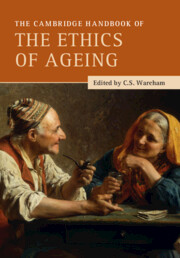Book contents
- The Cambridge Handbook of the Ethics of Ageing
- Cambridge Handbooks in Philosophy
- The Cambridge Handbook of the Ethics of Ageing
- Copyright page
- Contents
- Contributors
- Acknowledgements
- Introduction
- Part I Ageing and the Good Life
- Part II Ageing and Morality
- 8 Personhood across the Lifespan
- 9 African and East Asian Perspectives on Ageing
- 10 Special Obligations in Long-Standing Friendships
- 11 Forgiveness and Ageing
- 12 Life-Extending Treatments for People with Dementia
- 13 ‘Half in Love with Easeful Death’: Rational Suicide and the Elderly
- Part III Ageing and Society
- References
- Index
8 - Personhood across the Lifespan
from Part II - Ageing and Morality
Published online by Cambridge University Press: 23 August 2022
- The Cambridge Handbook of the Ethics of Ageing
- Cambridge Handbooks in Philosophy
- The Cambridge Handbook of the Ethics of Ageing
- Copyright page
- Contents
- Contributors
- Acknowledgements
- Introduction
- Part I Ageing and the Good Life
- Part II Ageing and Morality
- 8 Personhood across the Lifespan
- 9 African and East Asian Perspectives on Ageing
- 10 Special Obligations in Long-Standing Friendships
- 11 Forgiveness and Ageing
- 12 Life-Extending Treatments for People with Dementia
- 13 ‘Half in Love with Easeful Death’: Rational Suicide and the Elderly
- Part III Ageing and Society
- References
- Index
Summary
A prominent group of theories in bioethics hold that an individual’s moral status, the totality of moral consideration we owe to that individual, depends very significantly on whether the individual is a person. Only persons have full moral status, including the right not to be killed. Personhood theory has significant implications for how we should ethically and conceptually treat individuals who are not persons or whose personhood is in question. This chapter initially outlines the main elements of personhood theory and discusses the main complications and criticisms of this approach. Because of the size of the literature, the exposition is necessarily selective and not exhaustive. The latter part of the chapter then analyses different possible approaches to personhood across the lifespan and the ethical implications they raise, with a particular focus on the implications for the moral status of the old among us.
- Type
- Chapter
- Information
- The Cambridge Handbook of the Ethics of Ageing , pp. 105 - 117Publisher: Cambridge University PressPrint publication year: 2022
- 1
- Cited by

